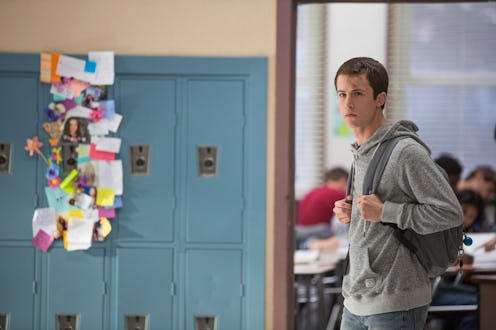
Throughout Netflix's 13 Reasons Why, the word "good" is used to describe Clay Jensen (played by Dylan Minnette) quite often. The late Hannah Baker uses the adjective as she wistfully recalls their interactions on the audio tapes detailing her reasons for suicide. But is Clay actually a good guy in 13 Reasons Why? It's a question both Clay and the viewer ponder in the series, which premiered on Netflix on March 31. The story follows what happens after a high schooler named Hannah posthumously leaves 13 confessional cassette tapes that reveal the incidents that led to her suicide — and Clay is shocked to find that one of the tapes is focused on him.
Spoilers ahead for 13 Reasons Why. Clay spends most of the series trying to figure out why Hannah included him. They nurtured a mutual attraction to each other and in Episode 12, Hannah confesses, "Clay, you aren't every other guy. You're different. You're good and kind and decent."
On the surface, Clay certainly is a sweet, good-natured, and thoughtful teenage guy. He shows up way too early to Jessica's house party and helps her set up. He rides his bike everywhere and seems to have a pretty good relationship with his parents. And the other classmates on Hannah's tapes are tense as Clay listens, because they believe that he is more likely to report their damaging secrets than anyone else.
Clay seemed to genuinely like and care about Hannah, despite other students spreading rumors about her reputation. But he never says it out loud. Hannah and Clay's interactions through the series show intense longing on both sides — Hannah chronicling what she wished she told Clay and what she hoped Clay would say to her, but didn't. Their story culminates when a visibly upset Hannah pushes Clay away as they made out at Jessica's party, and he leaves instead of trying harder to comfort her. That sums up a pattern in Clay's past and present character: he tends to do as he's told and stay in his own little bubble.
Skye, his childhood friend, notes that Clay "used to be cool," and though it's unclear what exactly she means by that, there are instances in which Clay acts selfishly. After Justin spread a rumor that Hannah was sexually promiscuous, Clay cruelly insults her out of jealousy, as he later admits to Tony. Clay also recalls masturbating to Tyler's viral photo of Hannah and Courtney kissing — and yes, I realize he's a teenage boy, but in that moment, he was no better than the other guys who objectified and taunted Hannah. Clay knows it, too, because he guiltily imagines his classmates confronting him about the photo.
Clay also lets his concern for Jeff slide at Jessica's party. Clay doesn't take Jeff's keys, offer to drive, or really do anything to prevent him from driving, even though Clay clearly doesn't believe Jeff when he says he's sober. When Jeff ultimately dies in a car accident, Clay (mistakenly) assumes he was drunk, and lashes out at Hannah for making Jeff's death all about her when she tried to reach out.
But what should Clay have done in those situations? He wasn't Hannah's boyfriend, but her movie theater co-worker with a crush who may have thought it wasn't his place to press her when she was upset. Jeff, meanwhile, was Clay's older friend, tutoree, and high school mentor. In those moments, Clay reacted the best he could and he didn't know what the other two were going through. It's easy to shout, "Do more" at the screen in hindsight, now knowing what happens to Hannah and Jeff, but we'll never know how they may have reacted if Clay had further interfered.
Years ago, I had a friend who constantly found her way into my business — she did it under the guise of "caring," but it seemed more like she was painting me as the villain who needed "fixing." As "good" as she was trying to be, I did not want her interference — and Jeff and Hannah may have felt the same way.
When Clay hears the tape about the night he made out with Hannah, he naturally blames himself. "I left and I knew I shouldn't have left," he tells Tony, the guardian of the tapes. "It all started with me." But Tony talks him down from a (literal) cliff's edge by asking if Clay truly believes that something he said could've changed the course of Hannah's life. "What does that make you, God?"
Clay imagines an alternate party makeout scene in which he tells Hannah that he's always loved her, but he's armed with what he knows now. Viewers will never know what would've happened if Clay had done that in the actual moment or how Hannah would've reacted to such a confession in her already vulnerable state.
But no matter how he could've acted, or even how he did, 13 Reasons Why suggests that no one, including Clay, is wholly "good." Whether it was something they did to Hannah, something they didn't do, or how they reacted in the wake of her death, no single person is innocent or solely to blame. The best they can hope for is to learn from this tragedy and let it shape how they treat people in the future.